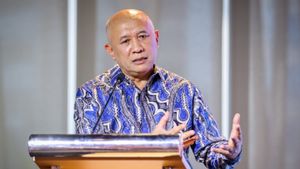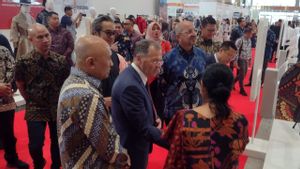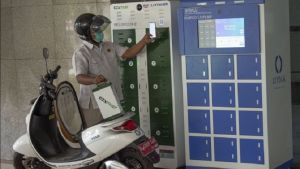JAKARTA - The Ministry of Cooperatives and SMEs (Kemenkop UKM) encourages Islamic boarding schools (kopontren) cooperatives, including those in North Sumatra (North Sumatra) to become a cluster of new economic growth, by being connected to the supply chain of large and global businesses.
Special Staff to the Minister of Cooperatives and SMEs (Stafsus Menkop UKM) for Economic Empowerment M Riza Damanik said, as a country with the largest Muslim population in the world, Indonesian MSMEs should be able to become a qibla from the halal industry in the world arena.
"Indonesia as the country with the largest Muslim population in the world, as well as the number of Islamic boarding schools of around 39,000 with a total of more than 4 million students is the potential to start economic development based on supply chains. That way, our MSMEs can become qiblats from the world halal industry," Riza said in a written statement received by VOI, Tuesday, December 5.
To achieve this, Riza said, there are two prerequisites in realizing Indonesia as the world's halal industry qibla, namely Human Resources (HR) that excel and have technological innovation.
"In the past, the strength of countries in the world was to rely on Natural Resources (SDA), who owns their abundant natural resources. But now they have changed, countries that have strong human resources, those who rule the world," he said.
The capacity building activity for 30 Kopontren administrators, with the theme Strengthening Business Management and Supply Chain Business Development which will be held from November 30 to December 3, 2023 in North Sumatra, is expected to be able to produce strong and independent economic fighters based on the Kopontren.
"Has natural resources important but it's even more important to have superior human resources," he said.
He also gave an example, Japan, which has set its national strategic industry in the automotive and electronic industries, so that at the same time Japan's MSME centers will support the industry.
"So, every time we use a car made in Japan, we actually use car spare parts from Japanese MSMEs. The contribution of Japanese MSMEs to their GDP is more than 60 percent, Japanese MSMEs are connected to the supply chain of large businesses," said Riza Damanik.
Riza also asked the Kopontren in North Sumatra to imitate the Al-Ittifaq Kopontren which has successfully connected to modern retail markets such as AEON Mall, Superindo, and others.
"After this scheme occurs, cooperatives get financing, farmers who previously did not access financing can access financing. Cooperatives receive financing from LPDB-KUMKM. Cooperatives can buy in cash to farmers. This supply chain wants to be developed," he said.
SEE ALSO:
Meanwhile, the Head of the North Sumatra Provincial Cooperatives and SMEs Office, Naslindo Sirait, said that the Kopontren had a strategic role as a driving force for the nation's economy.
"The boarding school is the driving force and driving cooperatives in the village as well as building a cultural socio, namely the importance of groups growing economically and socially," he said.
Naslindo is also committed to developing a Kopontren in North Sumatra to be able to connect to the supply chain of large businesses, so as to create new economic resources.
The English, Chinese, Japanese, Arabic, and French versions are automatically generated by the AI. So there may still be inaccuracies in translating, please always see Indonesian as our main language. (system supported by DigitalSiber.id)
















